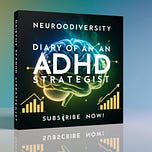The Silent Struggle
Jamie sat in her therapist's office, tears streaming down her face. "I always thought I was just lazy and unmotivated—that's what mom always told me anyway.
It wasn't until college that I got diagnosed with ADHD. But even with medication and strategies, I still hear her voice criticizing my every move."
Jamie's story isn't unique. Countless adults with ADHD carry the invisible wounds of growing up with a narcissistic parent
A challenging combination that creates unique hurdles for personal development and emotional well-being.
I still hear her voice criticizing my every move.
Breaking It Down: The Challenging Intersection
ADHD (Attention-Deficit/Hyperactivity Disorder) is a neurodevelopmental condition characterized by difficulties with attention, impulsivity, and sometimes hyperactivity that significantly impacts daily functioning.
Narcissistic parenting, meanwhile, involves a pattern of self-centered, controlling behaviors where the parent prioritizes their needs and image above all.
When these two realities collide, children with ADHD face a perfect storm: a neurological condition that makes certain tasks challenging, combined with a parent who may be incapable of providing the understanding, accommodation, and unconditional support they desperately need.
Why This Matters
Understanding this intersection matters because it affects approximately 2-3% of children with ADHD who also have narcissistic parents, creating lasting impacts on their mental health.
Adults who grew up in these environments often struggle with chronic self-doubt, anxiety, depression, and difficulty recognizing their own needs and personal boundaries.
This knowledge helps explain persistent patterns that medication and typical ADHD strategies alone cannot address. It validates experiences that many have felt but couldn't previously put into words. 🧩
For those affected, recognizing this dynamic is often the first step toward healing and developing healthier relationships with themselves and with others.
The Science Behind It
Research has illuminated the challenging dynamics at play when ADHD and narcissistic parenting intersect:
Studies show that supportive parenting is crucial for ADHD management, yet narcissistic parents often provide inconsistent support tied to their own emotional needs.
A study in the Journal of Attention Disorders found that children with ADHD who received inconsistent parenting showed worse outcomes than those with consistently supportive parental figures.
Narcissistic parents tend to view their children as extensions of themselves rather than as individuals with unique needs. Research published in Clinical Psychology Review demonstrates that this perspective is particularly harmful for children with ADHD, who require individualized support for their neurological differences.
The shame and criticism often employed by narcissistic parents can exacerbate ADHD symptoms. Neuroimaging studies reveal that emotional distress directly impacts executive functioning in the ADHD brain, creating a negative feedback loop of worsening symptoms.
Research from the Journal of Child Psychology and Psychiatry indicates that children with ADHD are more vulnerable to internalizing parental criticism, potentially leading to what psychologists call "toxic shame"—a pervasive feeling of being fundamentally flawed or inherently defective.
Making It Work: Healing Steps for Adult Children
✅ Step 1:
Recognize the Patterns – Breaking free from inherited beliefs.
Start by understanding that many of your negative self-perceptions may have been installed by a parent with narcissistic traits. Document specific phrases, criticisms, or beliefs that replay in your mind, then question their actual validity.
ADHD coach Terry Matlen notes, "Many adults with ADHD who grew up with narcissistic parents struggle to distinguish between their actual ADHD challenges and the exaggerated failings their parents projected onto them."
✅ Step 2:
Rebuild Executive Functioning – Overcoming critical paralysis.
Narcissistic parenting often creates fear around making mistakes, which can paralyze ADHD adults who already struggle with task initiation and organization. Create safe, judgment-free systems for managing ADHD challenges that include self-compassion by design.
For example, instead of saying "I need to organize my desk or else I'm a failure," try "I'm giving myself 15 minutes to improve my workspace, and any progress is worth celebrating."
✅ Step 3:
Establish Boundaries – Protecting your well-being.
Learn to identify when old patterns emerge in current relationships. Practice scripts like "I need time to consider that" or "That doesn't work for me" without extensive justification that narcissistic parents may have demanded previously.
✅ Step 4:
Find Your Tribe – Creating affirming connections.
Seek relationships with people who appreciate your ADHD traits and provide the validation and understanding that may have been absent in childhood. Support groups specifically for adults with ADHD who had difficult childhoods can be particularly healing spaces.
Real-Life Examples in Action
Case Study: Michael's Transformation
Michael, a 38-year-old software developer with ADHD, grew up with a mother who showcased his achievements to friends but privately berated him for his "careless mistakes" and "embarrassing behaviors."
As an adult, he developed severe perfectionism that paradoxically worsened his ADHD symptoms—he'd procrastinate on projects until the last minute, terrified of producing imperfect work products.
Through therapy, Michael realized how his mother's narcissistic tendencies had trained him to associate his worth with flawless performance. He began implementing a "good enough" policy for tasks, setting timers for 25 minutes of focused work followed by a small reward, completely separate from the quality of his output.
Within six months, his productivity improved dramatically. More importantly, his anxiety decreased, and he started enjoying activities he previously avoided for fear of not being "the best at them."
Case Study: Sophia's Journey
Sophia, a 42-year-old teacher with ADHD, grew up with a father who boasted about her academic achievements but punished her severely for ADHD-related behaviors like forgetfulness or emotional outbursts.
As an adult, she developed "rejection sensitive dysphoria"—an intense fear of disapproval common in people with ADHD.
Working with a therapist specializing in both ADHD and trauma, Sophia implemented regular "emotional check-ins" throughout her day. She used a discrete app on her phone to rate her emotional state and identify triggers before they escalated too far.
She also developed a "validation blueprint"—a document that helped her distinguish between constructive feedback and the kind of shaming criticism she received as a child.
This tool helped her respond appropriately to workplace feedback without spiraling into emotional dysregulation.
Pro Tips & Insider Insights
👉 The "Gray Rock" technique can be effective when interacting with a narcissistic parent. Be politely boring, providing minimal emotional reaction that might feed their need for dramatic interaction.
👉 ADHD medication effectiveness can sometimes be compromised by the stress of narcissistic abuse. Work with your doctor to adjust treatment if you notice this happening regularly.
👉 Practice "opposite action" when shame arises: If shame makes you want to hide, deliberately share your experience with a safe person instead of isolating yourself.
👉 Create a "reality check buddy" system with a trusted friend who can help you distinguish between legitimate criticism and internalized narcissistic parental messaging.
Quick Cheat Sheet: Key Takeaways
🔑 Your ADHD is real and valid, regardless of how it was portrayed by narcissistic family members.
🔑 Healing requires addressing both ADHD management AND the emotional wounds from narcissistic parenting patterns.
🔑 Self-compassion isn't self-indulgence—it's a necessary counterbalance to internalized critical voices.
🔑 You are not responsible for managing a narcissistic parent's emotions about your ADHD or otherwise.
Further Reading (Books & Resources)
📖 "You're Not Lazy, Stupid, or Crazy!: A Self-Help Book for Adults with Attention Deficit Disorder" by Kate Kelly and Peggy Ramundo
📖 "Will I Ever Be Good Enough?: Healing the Daughters of Narcissistic Mothers" by Karyl McBride, Ph.D.
📖 "Scattered Minds: The Origins and Healing of Attention Deficit Disorder" by Gabor Maté, M.D.
📖 "Adult Children of Emotionally Immature Parents" by Lindsay C. Gibson, PsyD
Practical Tools & Apps
🔧 Woebot – AI-based cognitive behavioral therapy app that helps identify negative thought patterns
🔧 Todoist – Task management app with visual progress indicators that provide non-judgmental feedback
🔧 Headspace – Meditation app with specific programs for ADHD and childhood trauma
🔧 Voice Memo Apps – For recording positive affirmations in your own voice to counter internalized critical messages
Research & Studies Section (Citations & Sources)
Modesto-Lowe, V., Chaplin, M., Soovajian, V., & Meyer, A. (2013). Parent role in the development of comorbid emotional difficulties in children with ADHD. Harvard Review of Psychiatry, 21(5), 201-215.
Psychogiou, L., Daley, D. M., Thompson, M. J., & Sonuga-Barke, E. J. (2007). Mothers' expressed emotion toward their school-aged sons: Associations with child and maternal symptoms of psychopathology. European Child & Adolescent Psychiatry, 16(7), 458-464.
Dunn, W., Coster, W., Orsmond, G. I., & Cohn, E. S. (2009). Household task participation of children with and without attentional problems. Physical & Occupational Therapy In Pediatrics, 29(3), 258-273.
Chronis-Tuscano, A., Molina, B. S., Pelham, W. E., Applegate, B., Dahlke, A., Overmeyer, M., & Lahey, B. B. (2010). Very early predictors of adolescent depression and suicide attempts in children with attention-deficit/hyperactivity disorder. Archives of General Psychiatry, 67(10), 1044-1051.
Hallowell, E. M., & Ratey, J. J. (2021). ADHD 2.0: New Science and Essential Strategies for Thriving with Distraction--from Childhood through Adulthood. Ballantine Books.
Moving Forward
Remember that healing is not linear—it's a process of gradual improvement with occasional setbacks that are part of the journey.
Being gentle with yourself during this process isn't just nice—it's necessary for rewiring the neural pathways shaped by years of narcissistic parental conditioning.
Your ADHD is not a character flaw, and the critical messages you received were more about your parent's limitations than your worth.
By understanding this unique intersection of ADHD and narcissistic parenting, you can begin separating the genuine challenges of ADHD from the distorted lens through which you may have learned to view yourself through.
The path forward involves both practical ADHD management strategies and deeper emotional healing work.
Each small step you take builds resilience and creates space for your authentic self to finally emerge.
If this could help someone then please share it
If you could help someone by commenting please do so
🎧 For more insights, check out Diary of a ADHD strategist podcast:















Share this post